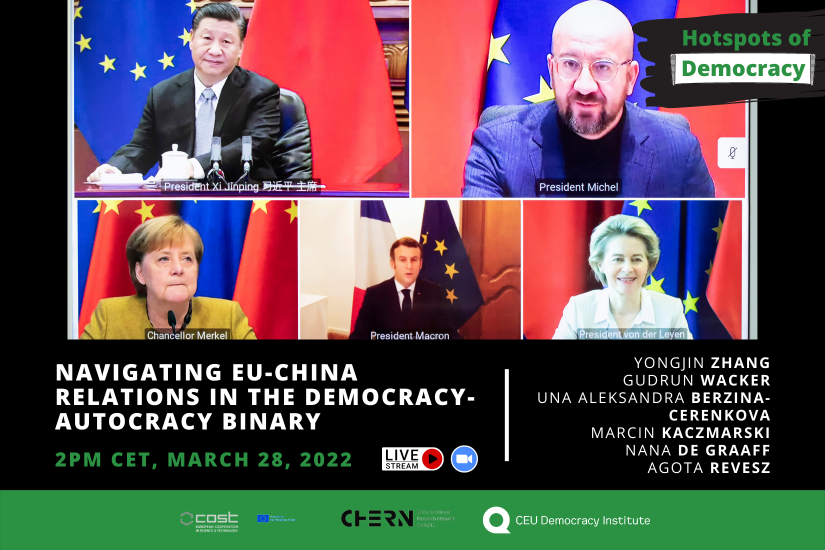
The past three years have seen a world in isolation, China has practically shut its doors airtight. Our democracy is ailing and needs corrections or even a full-scale transformation. Institutions for global governance that could efficiently fight against a pandemic or climate change are barely functional. Against this backdrop we can see a strong re-emergence of the narrative that divides the world into democracies and autocracies. The new German government seems to abandon the “change through trade” approach vis-à-vis China and move towards a more uniform foreign policy which prioritizes values over financial gain. The most recent EU approach is also transatlantic commitment instead of “strategic hedging”. With the current polarization, however, the world has ended up in a new Cold (or even Hot?) War along the democracy-autocracy binary. The topic of the discussion is the reasons behind and the consequences of this binary narrative, and how it might affect the China-policy of the EU.
Please note that this is an online event, co-organized with the China in Europe Research Network (CHERN), a Europe-wide network aimed at pooling, exchanging, disseminating and generating research on Chinese socio-economic engagements with Europe. To attend, please register here.
PANELISTS:
 Yongjin Zhang is Professor of International Politics at the School of Sociology, Politics and International Studies at the University of Bristol. His principal research interest and publications cut across the disciplinary boundaries of International Relations theory and Chinese history, politics, economic transformation and international relations. His core research informs and is informed by the ‘English School’ tradition in International Relations theory, but the broad theoretical approach he adopts is more appropriately regarded as eclectic. One of his current research projects is on International Relations in Ancient China: Ideas, Institutions and Law, an interdisciplinary enquiry drawing upon Chinese political philosophy, history of ideas, ancient history and theories of international relations.
Yongjin Zhang is Professor of International Politics at the School of Sociology, Politics and International Studies at the University of Bristol. His principal research interest and publications cut across the disciplinary boundaries of International Relations theory and Chinese history, politics, economic transformation and international relations. His core research informs and is informed by the ‘English School’ tradition in International Relations theory, but the broad theoretical approach he adopts is more appropriately regarded as eclectic. One of his current research projects is on International Relations in Ancient China: Ideas, Institutions and Law, an interdisciplinary enquiry drawing upon Chinese political philosophy, history of ideas, ancient history and theories of international relations.
 Gudrun Wacker is Senior Fellow in the Asia Division at the German Institute for International and Security Affairs (Stiftung Wissenschaft und Politik, SWP) in Berlin, a think tank providing political advice to the German government and parliament. Her research focuses on Chinese foreign and security policy, especially EU-China relations, China and the Asia-Pacific region and security cooperation in the Asia-Pacific more generally. She has been organizing the “Berlin Conference on Asian Security” (BCAS) held annually at SWP in Berlin and she has been co-organizing an annual track two dialogue between EU and China on cross-strait relations with the Shanghai Institutes for International Relations. She is currently a member of the Steering Committee of CSCAP EU and EU delegate at the Experts and Eminent Persons Group of the ASEAN Regional Forum.
Gudrun Wacker is Senior Fellow in the Asia Division at the German Institute for International and Security Affairs (Stiftung Wissenschaft und Politik, SWP) in Berlin, a think tank providing political advice to the German government and parliament. Her research focuses on Chinese foreign and security policy, especially EU-China relations, China and the Asia-Pacific region and security cooperation in the Asia-Pacific more generally. She has been organizing the “Berlin Conference on Asian Security” (BCAS) held annually at SWP in Berlin and she has been co-organizing an annual track two dialogue between EU and China on cross-strait relations with the Shanghai Institutes for International Relations. She is currently a member of the Steering Committee of CSCAP EU and EU delegate at the Experts and Eminent Persons Group of the ASEAN Regional Forum.
 Una Aleksandra Bērziņa-Čerenkova is a political scientist, China scholar, Head of Political Science PhD program and China Studies Center at Riga Stradins University, Head of Asia program at the Latvian Institute of International Affairs, a member of CHERN and European Think-tank Network on China (ETNC). After having defended her doctoral dissertation on Chinese political discourse in the Hu Jintao period, she has held a Senior Visiting Research Scholar position at Fudan University School of Philosophy, Shanghai, a Fulbright Visiting Scholar position at the Stanford University Center for East Asia Studies, and a MERICS European China Policy fellowship.
Una Aleksandra Bērziņa-Čerenkova is a political scientist, China scholar, Head of Political Science PhD program and China Studies Center at Riga Stradins University, Head of Asia program at the Latvian Institute of International Affairs, a member of CHERN and European Think-tank Network on China (ETNC). After having defended her doctoral dissertation on Chinese political discourse in the Hu Jintao period, she has held a Senior Visiting Research Scholar position at Fudan University School of Philosophy, Shanghai, a Fulbright Visiting Scholar position at the Stanford University Center for East Asia Studies, and a MERICS European China Policy fellowship.
DISCUSSANTS:
 Marcin Kaczmarski is a Lecturer in Security Studies at the School of Social and Political Sciences. In his research, he focuses on Russia-China relations, Russia’s foreign and security policy, comparative regionalism, and the role of rising powers in international politics. He is the author of Russia-China relations in the post-crisis international order (Routledge 2015) and published articles in leading academic journals, including International Affairs, International Politics and Europe-Asia Studies. He was a visiting scholar at the Chengchi University in Taiwan, the Slavic-Eurasian Research Center in Japan, the Aleksanteri Institute in Finland, the Kennan Institute in Washington, DC, and the Shanghai International Studies University in China. Prior to joining the University of Glasgow, He combined research and teaching at the University of Warsaw with policy-oriented analysis for the Finnish Institute of International Affairs in Helsinki and the Centre for Eastern Studies in Warsaw.
Marcin Kaczmarski is a Lecturer in Security Studies at the School of Social and Political Sciences. In his research, he focuses on Russia-China relations, Russia’s foreign and security policy, comparative regionalism, and the role of rising powers in international politics. He is the author of Russia-China relations in the post-crisis international order (Routledge 2015) and published articles in leading academic journals, including International Affairs, International Politics and Europe-Asia Studies. He was a visiting scholar at the Chengchi University in Taiwan, the Slavic-Eurasian Research Center in Japan, the Aleksanteri Institute in Finland, the Kennan Institute in Washington, DC, and the Shanghai International Studies University in China. Prior to joining the University of Glasgow, He combined research and teaching at the University of Warsaw with policy-oriented analysis for the Finnish Institute of International Affairs in Helsinki and the Centre for Eastern Studies in Warsaw.
 Nana de Graaff is the Chair of CHERN, and Associate Professor in International Relations at the Department of Political Science and Public Administration at Vrije Universiteit Amsterdam. Her main research interests are within International Relations, International Political Economy and Elite Studies (political sociology). Her particular research fields are Chinese political and economic elites, the globalization of Chinese firms and Chinese engagements with Europe; American political and economic elites and US foreign policy, US-China relations, and the politics and political economy of oil. She publishes in leading journals in International Relations, International Political Economy, and Sociology (e.g. Review of International Political Economy, European Journal of International Relations, International Affairs, Global Networks) and with publishers like Routledge and Cambridge University Press.
Nana de Graaff is the Chair of CHERN, and Associate Professor in International Relations at the Department of Political Science and Public Administration at Vrije Universiteit Amsterdam. Her main research interests are within International Relations, International Political Economy and Elite Studies (political sociology). Her particular research fields are Chinese political and economic elites, the globalization of Chinese firms and Chinese engagements with Europe; American political and economic elites and US foreign policy, US-China relations, and the politics and political economy of oil. She publishes in leading journals in International Relations, International Political Economy, and Sociology (e.g. Review of International Political Economy, European Journal of International Relations, International Affairs, Global Networks) and with publishers like Routledge and Cambridge University Press.
MODERATOR:
 Agota Revesz is academic staff member at the Center for Cultural Studies on Science and Technology in China, Technische Universität Berlin. She holds a degree in English, Sinology and Comparative Literature, and a separate degree in Theater Directing. She worked in Hungary-China cultural exchange projects before being assigned as a diplomat for Hungary in China. In 2015 she moved to Berlin where she now leads a China-competence project and teaches on China. Her current research foci are Chinese media and EU-China relations and perceptions. She is coordinator for the working group "Public diplomacy and knowledge production" in CHERN.
Agota Revesz is academic staff member at the Center for Cultural Studies on Science and Technology in China, Technische Universität Berlin. She holds a degree in English, Sinology and Comparative Literature, and a separate degree in Theater Directing. She worked in Hungary-China cultural exchange projects before being assigned as a diplomat for Hungary in China. In 2015 she moved to Berlin where she now leads a China-competence project and teaches on China. Her current research foci are Chinese media and EU-China relations and perceptions. She is coordinator for the working group "Public diplomacy and knowledge production" in CHERN.
Photo used in cover: European Union, 2020 / Photographer: Lukasz Kobus